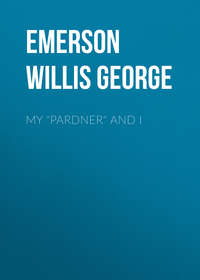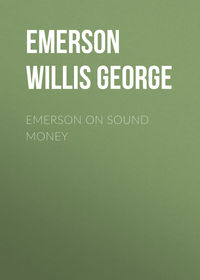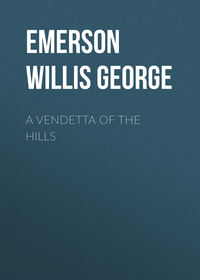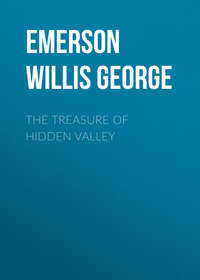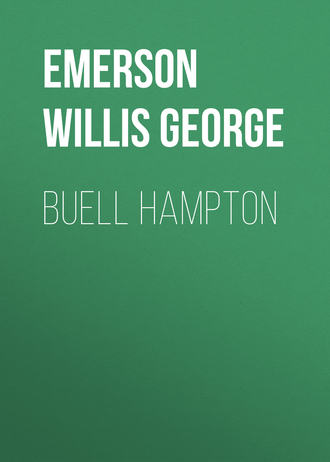 полная версия
полная версияBuell Hampton
This race was but a preliminary to greater things. It was simply a practice run compared with another sprinting contest between Mounce and Lynn, which took place some two weeks later – a contest still memorable in the annals of foot-racing in the Southwest.
Judge Lynn sent word to his cowboy backers that he was training nightly, and would put up the race of his life. While the judge was thus living in seclusion by day and practising by night, an evil report became noised about, that the judge had thrown the former race for the price of a gallon of whiskey. Few, however, believed the rumor.
Now, as the time for the second race drew near, interest became very great, and all the people interested in racing contests were on the tiptoe of expectation.
The place selected for the affair was in the valley, some two miles south of Meade, on the banks of the Manaroya. Here the sod had been removed and an ideal race-course made.
The day came on and was a perfect one. The valley lay like a basin, with its borders yellowed with countless sunflowers; a large drove of fatted cattle were peacefully grazing just below the racetrack, while the winding waters of the Manaroya cut the valley like a restless ribbon. Not less than two thousand people were present to witness the greatly advertised race. The interest may have been somewhat farcical with many, for, in truth, it could be little more, at best, than a “fat man’s race.”
Lynn himself had arrived early and had gone over the track carefully, surveying, apparently, every inch of it with all the critical acumen of a veteran in the business. He was clad in a long robe – a Cardinal Richelieu affair – that swept the ground. He was silent, even stoical, and this unnatural phase gave him an unusually wise appearance.
Seaton Cornwall, an Englishman loved by everybody who knew him, had been selected judge of the race. He, in turn, appointed a score or more of time-keepers, as if fearful that some error might occur in obtaining a new record in Western sprinting.
When all was apparently in readiness for the dash, some of the cowboys called Judge Lynn to one side for a conference. His backers withdrew and surrounded him. To the great throngs of spectators it was evident that the cattlemen had some special instructions for the judge, and so they had. One wild-looking fellow, Orth Hudson by name, with leather leggins, spurs, sombrero, and a brace of revolvers, acted as spokesman. “Judge Lynn,” he said, “on the other race, which ye pretendid to run, most of us fellers bet heavy and lost a month’s wages on ye. Some say as how ye throwed that race fur a gallon of whiskey. If ye did, you’se ought to be killed. Now, we’re still b’lievin’ in ye – money talks – an’ we’re goin’ to back ye agin an’ put up our last dollar on ye. We’re proposin’ to git every cent these ‘ere farmers hev got; but, Judge, it’s up to you – do ye savey? it’s up to you. We’re not lustin’ fur trouble, Judge, and I don’t like much to say it, but I has to, ‘cause I’s been picked out by the fellers to spechully tell ye plain that ye’ll win this ‘ere race or be shot. I tell ye this so there’ll be no mis-onderstandin’. We’re proposin’ to be ca’m, but if ye lose this ‘ere race, there’ll be a stampede ensue, an’ you’ll not last long to pester the landscape with yer explainin’ o’ things.”
Judge Lynn turned pale. “Gentlemen,” said he, “I’ll win this race or die.”
“Yes,” said the cowboys in chorus, “that’s what we’ve ‘greed on,” and they carelessly laid their drawn revolvers across the pommels of their saddles.
“Judge,” continued the spokesman, “we’re predictin’ if ye cross that ‘ere tape line behind Bill Mounce, we’ll fill ye fuller o’ holes than the top end of an old-fashioned tin pepper-box. Do you see?”
The judge saw. He was easily the worst scared man in the big Southwest at that very minute.
The cowboys wheeled their ponies around and galloped for position, and the judge, unattended, walked thoughtfully back to the starting-place, still retaining his distinguished robe.
Now, when time was called, the people were treated to a number not on the program – a sight that must ever remain vividly fixed in the recollection of every man who witnessed the incident. It was the judge. He stepped out from under his huge cloak, and behold “the little man in red” – he underwent, as if by magic, a strange metamorphosis. He was clad in a skin-tight suit of flaming red material, and looked a veritable Mephistopheles. The people saw the grotesqueness of his make-up, and sent up deafening yells.
The blacksmith looked upon his athletic rival and trembled. The fantastic attire of the judge was evidently driving terror into his heart.
Judge Linus Lynn had come to win, even if it took blood, or the appearance of it, to encompass his adversary’s defeat.
Now, the burly horse-shoer was attired in his usual clothing, save his leathern apron used at the forge had been laid aside. His feet were bare and his trousers rolled up to his knees.
Seaton Cornwall shouted, “Ready!” The contestants lined up. Lynn crouched so low for the start that his round head seemed to be on a line with his knees.
“Ready!” repeated Cornwall, and then a pistol-shot started the men away over the course. The report of the pistol silenced every tongue. Even the lazy cattle looked up in mild-eyed wonderment at the pranks of men.
Both sides of the track were patrolled by mounted cowboys with drawn revolvers. The rolling ball in red understood the meaning, – his eyes bulged out in awful effort.
At the end of twenty-five yards Lynn was leading Mounce by about seven feet – at fifty yards their relative positions were unchanged. The muscles of the blacksmith’s legs, below the knees, were knotted in terrible tension, and his teeth were clinched in desperation. At the end of seventy-five yards he was running nearly abreast with the figure in red. Both men were puffing like hedgehogs. Then the people shouted, each to his favorite, “Lay to,” “Lay to,” “Get there,” – and so they did – with a last mighty effort; but the horse-shoer “laid to” the better and won the race.
Lynn went madly on – nor looked back. Fifty shots were fired in the air. Visions of pepper-boxes floated before him. He was headed into the herd of cattle. Presendy he stopped and whirled about like magic. A bull, maddened by his fiery red attire, accepted the challenge like a Spanish bovine, and rushed toward him with fire in his eyes. The judge yelled in terror, and bounded away in awful fright, running as he had never run before. The bull was not a half dozen feet behind him, lunging in mad leaps, and bellowing a hoarse murderous roar, while his sharp horns were almost scraping the earth.
The people trembled with fear. The cowboys plunged their spurs deep into their ponies’ sides and galloped frantically to the rescue. They came alongside of the maddened bull and, quick as a flash, a score of bullets were buried in the bull’s heart, and he fell to the earth in the throes of sudden death.
It was all over in an instant, and then Lynn, seeing the danger was past, shouted, “Say, maybe you fellers think I was throwin’ that race with the bull, but I wasn’t. No, sirree. I was jist doing my level best and don’t you forget it.”
So ended the much talked of foot-race, – a contest that forever silenced Judge Lynn from talking of great sprinting exploits on the banks of the Wabash – or anywhere else.
CHAPTER XXII. – THE ELECTION
THE Tuesday following the incident of the foot-race was election day. The Patriot prophesied that, out of the three thousand probable votes cast in the county, fully sixteen hundred would be for the Populist ticket.
In private conversation Major Hampton confessed to Hugh that he really had no idea how the election would go. “You see, Stanton,” said he, “I am not a politician, although many believe me to be one. No, I am simply trying to use a political organization as a vehicle to carry into practice certain ideas emanating from truth, and which, practically applied, would better the condition of the masses. Politics with me is only a means to an end.”
They were in Hugh’s room at the hotel when this conversation occurred. The major walked back and forth across the room, as he talked in confidence with Hugh about the probable result of the election.
Hugh noticed that the lines in his old friend’s face would deepen at times like veritable hillside gullies that had been plowed deep by the waters of a mountain torrent. Then, again, when he approached his one absorbing, altruistic idea of helping the poor, lifting up the suffering and benefiting mankind by surrounding them with conditions that would enable them to help themselves, – at such times the deep lines and furrows would almost wholly disappear from his face, and it seemed illuminated from some great light within, a phosphorescent reflection from some mighty reservoir of molten gold – perhaps from the old major’s heart.
Election day came, and Democrats, Republicans, and Populists all turned out in force to try to elect their different candidates. Crops of all kinds had been remarkably good in every township of the county, and both the Democrats and Republicans said that good crops argued well for their success. They contended that hot winds and poor crops were necessary adjuncts to a triumph of Populism at the polls. Each of the three parties, as is usual at election time, claimed that it would elect its own candidates by rousing pluralities.
The day after election, when the returns were all in, the astonishing fact was developed that the Democrats and Republicans had divided the elective offices about equally, while the Populists had polled in the entire county only fifty-five votes.
The Patriot came out the next day with a double-leaded editorial, in which Major Hampton scathed pretending Populists in unsparing terms. The article was as follows:
“FIFTY-FIVE TRUE MEN.”“The remnant of the Spartan band numbers, all told, fifty-five souls. These do not glory in saying, ‘There are only a few of us left,’ but are bowed down in abject humiliation at the thought of the Pharisees and hypocrites, with whom, in the past, they have been associated. These traitors pledged their support at yesterday’s election. They sold out to the enemy – they have bartered their votes, their manhood, and their honor, like Judas of old, for a few pieces of silver. The bloated bondholder and coupon-clipper – even the millionaire, with his ill-gotten gains – are as princes compared with these Ishmaelites who have bartered away their very souls with their votes. Benedict Arnold, who attempted to betray his country, was not more despicable than the low, groveling traitor who sells his vote. The “Patriot” boldly proclaims the fact that if every one in the county who professed to believe in the doctrine of purity and progress had voted his avowed sentiments, the Populist ticket would have received a majority of the votes in the county. Instead, however, but fifty-five loyal men had the courage to cast ballots that upheld the ticket and platform of the people.
“The editor of the “Patriot” desires to announce that he is about to embark in the ship “Argo” for a trip up Salt River; and like Jason, of heathen mythology, with his fifty-four companions, he expects to sail away, not in quest of a ‘golden fleece,’ but simply with a desire to breathe the pure air of self-respect. His good ship “Argo” shall be anchored where minorities are frequency stranded, away from the turbulent vicissitudes of political warfare.
“LATER.”“Since writing the above, the editor of the “Patriot” has been confronted with a condition that may seriously interfere with his contemplated trip in the ship “Argo”, as the bark is limited in its capacity. Over twelve hundred subscribers of the “Patriot” have called, each one solemnly assuring the editor, in strictest confidence, that he was of the immortal fifty-five. The facts conflict somewhat with the statements made by this cloud of witnesses, but as most of our callers have renewed their subscriptions to the “Patriot” for another year, we have concluded to go on making a valiant fight on the side of right, with a hope and a prayer that the returns of next year’s election may show a different result.”
A few evenings after the election, Bill Kinne-man and Dan Spencer and their three committeemen associates met in the old mill to divide their booty. As it was not the regular night for the Barley Hullers’ meeting, they had no fear of being molested.
“Say, Bill,” said one of the committeemen, “did you see the major’s editorial?”
“See it,” replied Kinneman, in a surly tone, “I surely did. Waal, Spencer, speekin’ wide-open like,” he continued, “it’s dang near time we hed thet report made.”
“All right,” replied he of the wabbling tooth, as he expectorated a vigorous pit-tew of tobacco juice toward a dark corner of the room, and stroked his short, stubby red beard with a greasy hand. “All right, boys. You see me an’ Bill onbosomed ourselves an’ whooped it up purty lively, an’ teched all the candidates as hard as we dared. All the Republican candidates an’ all the Democratic fellers snorted an’ cavorted ‘round an’ actooally threatened to stampede, but they fin’lly got genial an’ coughed up, or agreed to if they wuz ‘lected. When we come to the Populist candidates, nary a danged one of ‘em would give a cent, but some of ‘em talked mighty malignant like. You see they thought they had a spechul lead-pipe cinch, anyway, on the Barley Hullers’ votes, an’ put on superior airs, but that’s where they reckoned some porely an’ got left, see?” Whereupon all five of these stalwart committeemen laughed immoderately.
“Waal,” continued the tooth wabbler, “as soon as the returns of the ‘lection wuz in, me an’ Bill started out an’, bustin’ all over with p’liteness, tackled the fellers that wuz ‘lected, – part of ‘em Republicans an’ part of ‘em Democrats. You see we surely held a paper with their names to it, an’ they nach’ally had to cough up the money, ‘cause they’s afeard we’d blow on ‘em – leastways that’s what we told ‘em we’d do fur sure. Course we knowed too much to dun the fellers that wuz defeated. So here’s a thousan’ dollars fur you-alls, in long greens, to dervide up, – two hundred dollars apiece, – not so bad, eh?” The division was soon made, to the apparent satisfaction of all, and the conference broke up. When the other committeemen had gone, and Bill Kinneman and Dan Spencer were alone, Bill said:
“Look’e ‘ere, Dan, you reported a thousan’ dollars; how much did you sure’nuff git, now, on the squar? Be straight with yer pard, or somethin’ will happen. Yer personal’ty is liable to be scattered over the landscape. I’ve dun got the drap on you, an’ am feelin’ plenty hostile.” As he said this, he carelessly fingered his revolver.
“Course, Bill,” said Dan. “You see I collected sixteen hundred dollars. That leaves me an’ you three hundred dollars apiece more.”
“Waal, that’s more like it, an’ certainly prevents a misonderstandin’,” said Bill. “Course I nach’ally knew you wuz givin’ them jays a razzle-dazzle, but you cain’t razzle-dazzle me. I wish we could ‘a’ got along ‘thout ‘em, but as they usually do most of the kitchen work, an’ you an’ me git the big end of the boodle, I guess we’ve got no kick comin’.”
Presently they mounted their mustangs and started down the valley toward Meade.
“Say, Dan,” said Bill, “can you fur sure keep a secret?”
“Waal, if the court knows herself, I kin. What’s roamin’ ‘round permiscus-like on yer mind, Bill?”
“Waal, I ain’t got no partic’lar use fur thet Stanton feller. If I don’t miss my guess, he’s snoopin’ ‘round Major Hampton’s ranch.”
“What’s that to you, Bill?”
“Waal, speakin’ wide-open like, it’s a mighty sight to me, pard,” replied Bill. “I don’t intend Marie Hampton shall fall in love with thet highfalutin cuss, even if I’s got to scatter his nachalness over the landscape.”
“Put ‘er thar, Bill,” said Dan, extending his hand, and breathing hard on his restless tooth. “I don’t hev to hev a meetin’-house fall on me afore I see which way the wind’s a-blowin’. Thet Hugh Stanton is a kind o’ soopercilious, high-steppin’ chap, an’ if he goes to interferin’ with you, we’ll fix him as easy as rollin’ off a log. No use gettin’ peevish, Bill, but if his attitood is sort o’ pesterin’ you, jist say the word, an’ he’ll not be lustin’ fur trouble very long on this ‘ere range.”
“Do you mean it, pardner?”
“I surely do,” replied Dan.
“I don’t mind onbosomin’ myself,” said Kin-neman, “an’ sayin’ she’s the purtiest woman in the hull world, an’ I b’lieve the major ‘ill be favorable.”
“Course, Bill,” said Dan, “I’m married an’ hev nuthin’ to say, but if I wuz n’t you’d hev to speak up in meetin’ or you’d surely git left. Oh, I know a purty face when I sees it, an’ there ain’t nary a one on the range that compares with the major’s daughter.”
Kinneman’s swarthy face flushed with the greedy desire which he had long felt to possess Marie Hampton for his wife. Presently he said:
“Do you think I kin make it, Dan? I’m feelin’ a heap careless toward that ‘air Stanton feller.”
“Make it?” repeated Dan, “Course you kin. I’m assoomin’ you need n’t be afeerd of any man when it comes to sprucin’ up to a gal. If he’s got money an’ you ain’t, then it’s different agin,” and Dan Spencer leered at his companion with a wicked eye.
“Say, Dan,” Said Bill, “what would be yer attitood in a case of this ‘ere kind? Is moneybags to be respected more ‘n a man?”
“I’ll be hanged if I know fur sure,” replied Dan, as he scratched his chin, shut one eye, and breathed heavily against his big tooth. “If a man hangs ‘round an’ gits in the way betwixt you an’ sumthin’ you want, why, you’ve got to git him off the face of the airth, I reckon, even if an accidental shootin’ ensues.”
“Say, Dan,” said Bill, in a subdued voice, “I’ll bet big money you’re the nerviest feller I ever run agin’ on the range.”
“Waal,” said Dan, rather pleased at the compliment, “if there’s any money in it, jist try me.”
“Is that solid, Dan? Are you givin’ it to me straight?”
“Solid an’ straight, Bill, sure. Course it’s a heap o’ pressure to assoom; still, if the inducements are toomultuous ‘niff, I can sure git action on my artill’ry.”
“All right, I’ll not furgit yer promise. I may need you pow’rful suddin some o’ these ‘ere dark nights.”
“Waal, jist bring yer roll along when yer lookin’ fur me, an’ you’ll fin’ me dead game. Listen, what’s thet? Guess the major’s home sure ‘nuff, an’ playin’ on his fiddle.”
The two cowboys reined their ponies, and in silence listened to the melodious strains of the major’s violin. They were far down the valley from the major’s home, and the music seemed mellowed in the soft moonlight, and sweetened by the distance. He was playing “Home, Sweet Home,” with countless variations. The melody traveled lazily on the night currents, and, when it finally died away, trembled and rested like a benediction on the peace and quietude of the sleeping valley.
Soon Dan Spencer was galloping for his dug-out, east of Meade, and Bill Kinneman was heading his bronco across the prairie toward Horton’s ranch.
CHAPTER XXIII. – A FORGED LETTER
ALMOST a month had passed since Lord Avondale’s departure, and yet Hugh had not visited the Grove. He thought a great deal about Ethel, and he was conscious of a sense of relief now that the Englishman was gone.
One evening, about this time, he determined to pay the Hortons a visit. His reception was most cordial, and he fancied that there was more than usual of the old-time animation in Ethel’s eyes. An opportunity came during the evening, when they were alone, but he did not improve it as he had intended. He did not declare his love in words, though he felt confident that Ethel read his heart in his flushed face. Thus he procrastinated, day after day, until the weeks hastened into months, and the springtime of the year had come again.
During this time he saw much of the Hortons. The bond of friendship between the cattle king and himself had materially strengthened. Mr. Horton frequently warned him of the collapse, which he believed to be inevitable, of the hopes of all engaged in or dependent upon agricultural pursuits in Southwestern Kansas. At such times Hugh would listen patiently until the cattleman had finished, and then he would adroitly change the subject.
Both Major Hampton and Captain Osborn assured him that, while John Horton was doubtless perfectly sincere, yet the abundant yield of crops during the preceding years, and the entire absence of the hot winds, was proof, irrefragable, that the cattleman’s theory was wrong. They also believed that John Horton was sadly mistaken regarding the cattle thieves, who still continued their untiring and fearless raids. The claim of the cattlemen was that a coterie of farmers had banded themselves together for the profitable and yet dangerous business of cattle-stealing. John Horton was the heaviest loser, because his herds were so extensive. Captain Osborn’s views coincided with those expressed in the Patriot, – that the thieves were a band of cowboys acting under the direction of some able leader. Both these theories were freely discussed, while the cattle-stealing continued without interruption, and not the slightest clue was obtainable as to who did the lawless work.
The thieves knew, all too well, the punishment awaiting them if they should ever be captured, and its severity caused them to exercise the greatest caution.
There is an unwritten code on the frontier that a man may engage in a quarrel, and shoot and kill his adversary, provided both parties are armed and no unfair advantage is taken. If one has a number of such quarrels and each time “kills his man,” he then becomes a most formidable candidate for sheriff in his county. On the other hand, if two men quarrel and one comes upon the other stealthily and, without warning, shoots him in the back, the act is construed by this unwritten code of the West as being a cowardly murder. The assassin is usually taken to some “Dead Man’s Hollow” and shot to death. There is hardly a community on the frontier but has its “Dead Man’s Hollow,” where the “law” is administered at the hands of the vigilantes.
While this code prevents outside interference in a so-called “fair fight,” even though death may result to one of the parties, yet, if a cattle thief is caught, he must, without exception, pay the penalty with his life. Indeed, a thief is looked upon with less commiseration, if possible, than a cowardly murderer.
In the meantime, the winter months were gone, and spring was paying another visit to sunny Kansas. The boundless brown prairie was once more changed to a world of brightest green, and, far and wide, over the landscape were myriads of simple dandelions and modest daisies that danced to the wind like a vast constellation of twinkling stars.
The meadow-lark and the brown thrush had again returned to their summer home to herald the approach of another mating-time, but still Hugh Stanton had not declared his love to Ethel Horton, nor had Lord Avondale returned to pursue his wooing of the American heiress.
Hugh Stanton fancied that he detected a shadow of sorrow in the girl’s face, and in her voice; and a fear arose in his heart. Was she grieving because of Lord Avondale’s absence? His unselfish regard for Ethel was so keen that it caused him much pain. Over and over he assured himself that he would willingly surrender his own slight claim if in doing so he might add to her happiness.
One afternoon Mrs. J. Bruce-Horton came up from the Grove to see Mrs. Osborn. Even a casual observer could have told that the stately wife of the cattle king was unusually agitated. She mounted the Osborn steps and rang the bell in a nervous manner.
Soon after, these two friends were seated in Mrs. Osborn’s private room, engaged in earnest conversation.
“What shall I do, Lucy? What can I do? What ought I to do under the circumstances?”
“My dear Mrs. Horton,” replied her friend, suavely, “do not agitate yourself. It is the easiest thing in the world, I assure you, to arrange this seemingly unfortunate affair.”
“Oh, I don’t know, Lucy, whether it is easy or not. No one knows the half a mother endures with a marriageable daughter to look after.”
“Oh, fie!” Mrs. Osborn laughed, as she rang for her maid. The door opened, and, turning to the girl, she ordered a small bottle of Tokay, which was soon set before them. “Now, my dear, drink a glass of wine. It will strengthen your nerves.”


